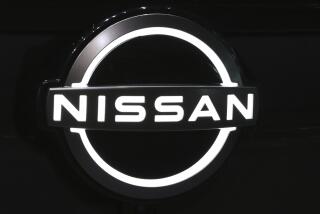Less-Powerful Air Bags OKd for Cars, Trucks
- Share via
DETROIT — Moving to prevent more deaths and quell a consumer outcry, federal safety regulators on Friday gave the nation’s auto makers approval to install less-powerful air bags in new cars and trucks.
The National Highway Traffic Safety Administration issued a rule that allows the car companies to reduce the force of a deploying air bag by 20% to 35% late in the 1997 model year. Air bags now inflate at up to 200 mph, in just 30-50 milliseconds.
The new regulation is part of a Clinton administration strategy “to preserve the benefits of air bags while minimizing the risk to children and smaller adults,” said NHTSA Adminstrator Ricardo Martinez, who has been criticized for moving too slowly to curb air-bag deaths and injuries.
Air bags are now found in more than 70 million vehicles, and as they become standard equipment, more severe injuries and deaths are being reported. Since 1991, 38 children and 24 small adults have been killed by air bags in low-speed crashes. But air bags have also saved an estimated 1,750 lives.
The majority of casualties have been people of slight stature who are unbelted or improperly belted, or sit too close to the steering wheel. Seat belts hold occupants in the correct position, away from the dash.
Slowing air bags’ deployment does not remove all their dangers, regulators were quick to acknowledge. In fact, slower-inflating devices may increase the potential for injury for unbelted adults. Regulators estimate that if all vehicles were equipped with slower inflating air bags it could save 47 children’s lives a year but result in the deaths of anywhere from 50 to 430 more unbelted adults in high-speed crashes.
One-third of Americans don’t wear seat belts, safety officials have estimated.
“It’s a trade-off we are willing to accept in this interim period,” said Philip Recht, NHTSA deputy administrator.
Federal safety regulators already have forced auto makers to install air-bag warning labels in vehicles and send out letters to consumers warning of the dangers to young children and infants in rear-facing child seats.
The government is also weighing other initiatives to mitigate air-bag dangers, including a controversial regulation that would allow customers to deactivate the bags. It is also likely to require auto makers to install so-called smart air-bag systems as the technology becomes available.
“This is a step forward, but it is absolutely not a permanent solution,” said Joan Claybrook, president of Public Citizen, a consumer advocacy group. “What is ultimately needed is smart air bags.”
Smart air bags use sensors and other “intelligent” systems that can interpret the weight and position of a passenger as well as the severity and direction of a crash. Such data are used to optimize deployment to suit the circumstances. The auto makers, however, argue that it could be several years before the smart systems are perfected and ready for consumer use.
These fatalities are the latest twist in a 25-year-long battle over air bags. As early as the 1970s, consumer groups held them up as the ultimate auto safety device. Detroit doggedly resisted air bags as unreliable and expensive before embracing them as marketing tools in the 1990s. There has been no proposal to retrofit current vehicles with new bags.
Both the industry and consumer groups support the measure announced Friday as a temporary step that can be quickly and easily adopted. Though the slower bags are optional, the auto companies are expected to install them in 1998 model year vehicles, which hit showrooms in October.
Both domestic and foreign auto makers sought authority to use air bags that inflate less aggressively, but argued that with such a system they could not meet federal safety standards for protecting adult, unbelted passengers.
To allow for less power, the federal government eased a part of the safety test that requires vehicles to be crashed into a wall at 30 mph. Instead, they can use a more forgiving test using a vehicle mounted on a sled.
“We anticipate that depowering air bags . . . will virtually eliminate inflation risk to adults and will substantially reduce the risk to small children,” said Robert Lange, General Motors Corp.’s director of safety engineering.
There is concern that reducing air-bag power only shifts the dangers from smaller individuals to larger ones, but some safety experts argue that it only transfers the risk from properly belted to unbelted passengers. And they see little chance of greater deaths for larger, unbelted males.
“Studies I have seen indicate there shouldn’t be much effect on large men, even those not using seat belts,” said Philip Haseltine, president of the American Coalition for Traffic Safety, an education organization funded by the auto industry.
The debate over more benign air bags is mild compared to the one shaping up over deactivation of the devices. The NHTSA recently proposed allowing consumers to disable their air bags.
It is now illegal for dealers, mechanics or consumers to disconnect an air bag without approval from the federal government. Typically, regulators only approve a turnoff for medical need, such as for a handicapped person who must sit too close to the air-bag module.
The proposal has alarmed both auto makers and consumer advocates who have united in an effort to dissuade regulators from letting people disconnect their air bag systems.
Consumer advocates say deactivation would send a message to consumers that air bags are more a danger than a lifesaver, and they fear such a message could lead to its demise as an effective safety device.
The auto makers also are concerned that consumers will be turned off by air bags, which the industry has invested heavily in. They also fear potential liability lawsuits if consumers are injured after disabling their air bags.
“It’s a very complex issue,” said Recht of the NHTSA, which is expected to issue a ruling in the coming month.
Public concern is clearly growing. Air-bag deaths of children have drawn widespread media coverage. In the past several months, the NHTSA has received more than 2,000 requests from consumers asking to disable their air bags.
Brian O’Neill, president of the Insurance Institute for Highway Safety, believes that regulators must do something to allay consumer concern about air bags. He believes being able to deactivate the devices would provide consumers comfort though very few would actually disable the air bags.
“Deactivation could serve as a relief valve,” said O’Neill.






